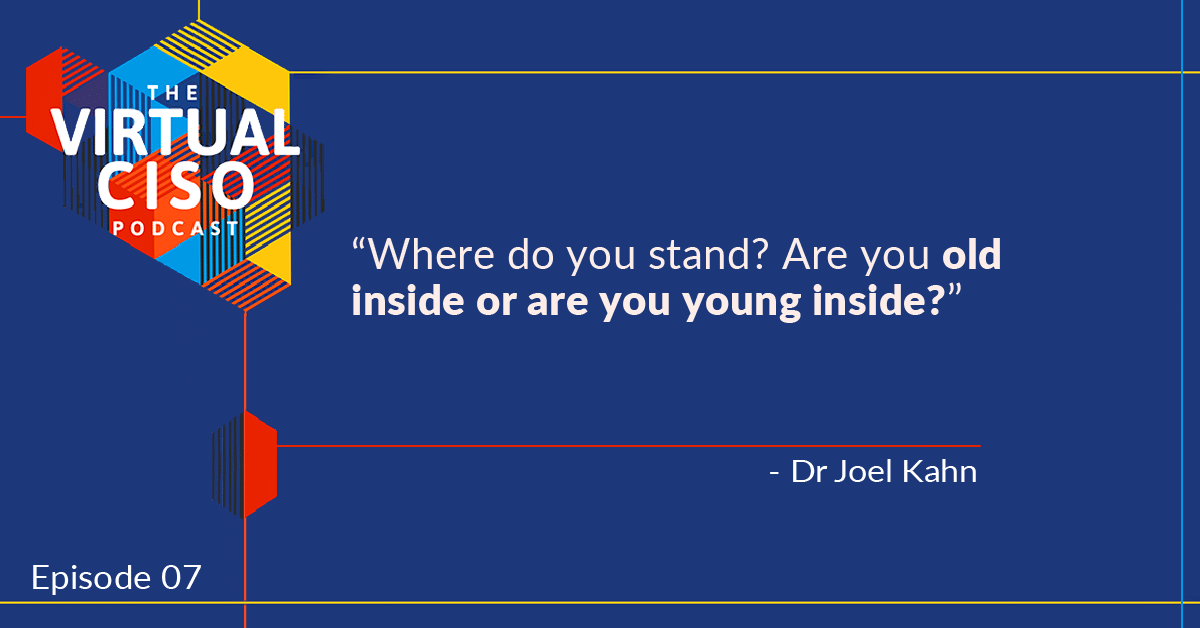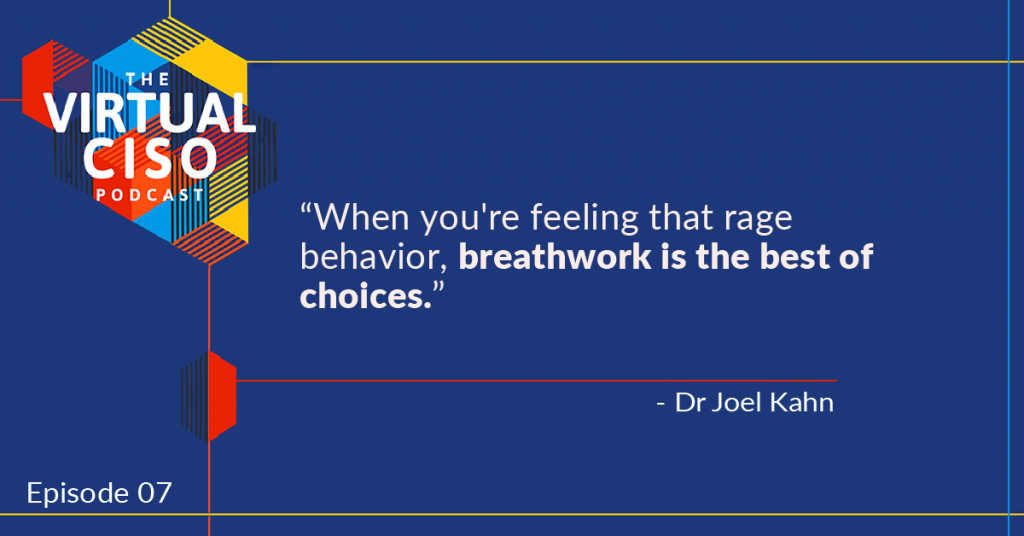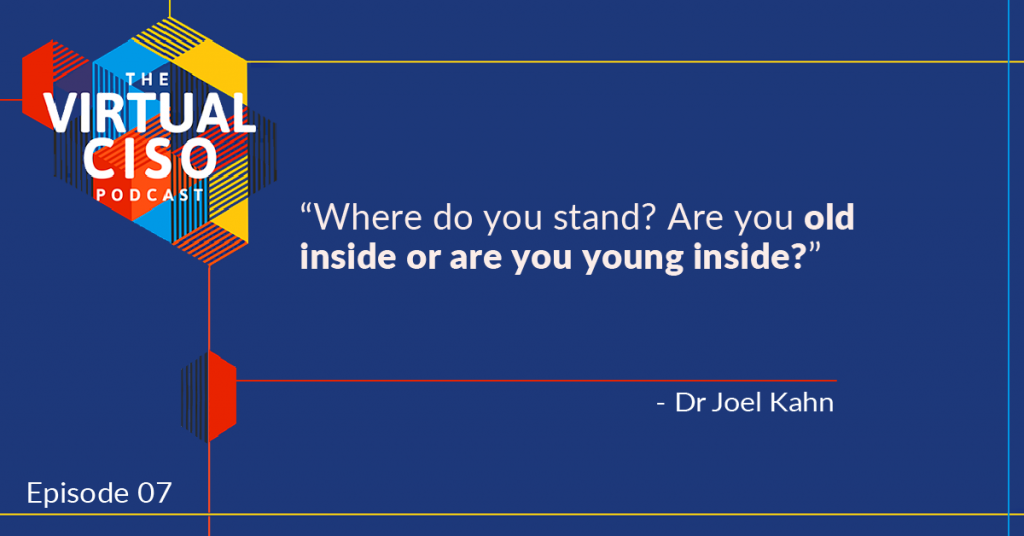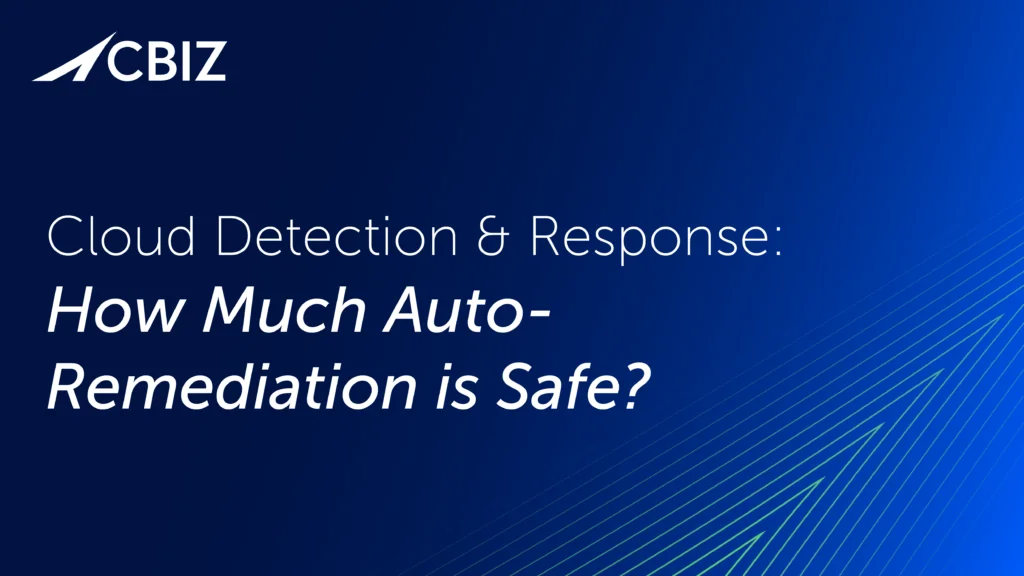Last Updated on February 12, 2025
If you thought this podcast was supposed to be about information security, you might be confused about why we’re featuring heart disease.
Bottom line: Dead CISOs don’t get bonuses.
Stress causes heart disease. Well, 99.99% of CISOs have a stressful job, right?
I was so excited to interview Dr. Joel Kahn, triple board certified cardiologist, author of 6 books, and restaurant owner—also my physician—about techniques for managing stress and preventing heart disease.
“I’m a reformed aggressive preventive cardiologist, believing with one of my trademark phrases, Prevent, not stent,” Dr. Kahn said. “Let’s do some good today here in 2020.”
The number one killer of men and women in the Western world is clogged arteries to the heart.
“Don’t wait until you’re in an emergency room,” Dr. Kahn said.
What role does stress play in that? Read on.
The truth about stress
In the field of information security, executives are under a tremendous amount of stress.
“It’s a fine line between stress and enjoying the pressure of performance,” Dr. Kahn said. How you react to stress—whether eagerly taking on more or pounding the table and grabbing for donuts—has a lot to do with its physical effects.
Dr. Kahn was perfectly clear about how bad stress is for you: The adverse effects of stress can raise your cortisol, hormones, blood sugar, cholesterol, and blood pressure. “Ultimately, day after day, it can impact the health of your arteries and therefore the health of your heart,” he said.
Stress specifically causes arteries to become more clogged. There’s no doubt about it. Stress leads to a greater likelihood of coronary artery calcification.
“Stress is that chronic injury to the lining of your arteries, what we call your endothelium. Ultimately you may be at risk for thickening and plaque and calcification,” Dr. Kahn said.
The good news is that there are many tools and strategies for managing stress—and genuinely prolonging your life.
Mitigating the impact of stress
Dr. Kahn shared 3 great techniques for mitigating stress.
1 — Find out if you have calcium in your arteries.
“If you don’t know something called your heart artery calcium score, you’re not in the game of being responsible to your health, your family, and your business,” Dr. Kahn said.
If you think you don’t have heart disease, well, be sure. To learn your Coronary Artery Calcium Scoring (CACS), get a calcium CT scan, which takes about 10 seconds and costs about $100.No means you’re 99.9% protected from heart disease for the next decade.
Yes means you’ve got silent and potentially serious heart disease that you need to start addressing.
2 — Do some breathwork.
You need to become mindful of when you’re getting red-faced and stressed. “When you’re feeling that rage and Type A behavior, breathwork is the best of choices,” Dr. Kahn said.
Doesn’t matter which app you use, but take a few minutes and use one. If you want to be low-tech on this, try Dr. Andrew Weil’s 4-7-8 breathing.
4 seconds breathe in through your nose
7 seconds hold your breath
8 seconds breathe out through your mouth
Four rounds of this is just 75 seconds, which immensely helps to rebalance your stress system.
3 — Take your fitness seriously.
Fitness takes discipline.
Physically move around during the day. Make healthy nutritional choices. Drink filtered water (nobody needs that much lead!). Invest in 7 hours of sleep.
“You can’t go to bed at one in the morning and wake up at six, and get seven hours. Nobody has an app that does that,” Dr. Kahn said.
If herbs and hormones aren’t your thing, try eating mostly plant-based food and learning how to order healthier dishes at restaurants.
Would you rather work out half an hour a day or be dead? For most of us, this choice isn’t exaggerated.
Silent risks
Partner with a physician to learn about the silent risk of hypertension.
“Lab testing has moved ahead by light years, just like the ability to use that CAC CT scan,” Dr. Kahn said. “Where do you stand? Are you old inside or are you young inside?”
Get some specialty tests to measure your inflammation, analyze your genetics, or check for other silent risks.
“One out of every four people inherited a cholesterol called lightbulb protein. It can destroy a heart valve, and it can destroy the arteries to your heart and your neck,” Dr. Kahn pointed out. Cholesterol bloodwork doesn’t test for this.
Looking to the future
Here are some of the advancements that Dr. Kahn is most excited about for the future:
- Gene therapies like STEM cells and CRISPR9
- Supplements that are presently being researched
- Artificial intelligence to assist in research and diagnosis
- Therapies to make lifestyle change seamless and fun
- Smartphone apps that can take sophisticated scans and monitor vital signs
Dr. Kahn also mentioned that erectile dysfunction can be a warning sign of clogged arteries. “It can predict three to four years before a heart attack that there’s a vascular problem, clogged blood vessels to the pelvis,” he explained.
“To have responsibility in a fiduciary sense to your family and your business, you need to figure out how do to get that CACS or that bloodwork,” Dr. Kahn said.
Contact Dr. Kahn on Twitter and Instagram @drjkahn or on his website.
This post is based on a Virtual CISO podcast with Dr. Joel Kahn. To hear this episode in its entirety, and many more like it, you can subscribe to The Virtual CISO Podcast here.
If you don’t use Apple Podcasts, you can find all our episodes here.
























